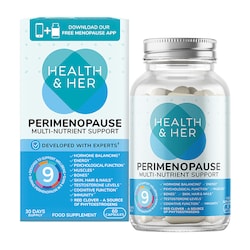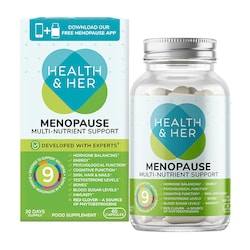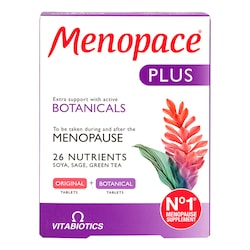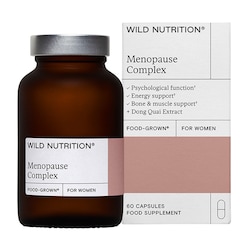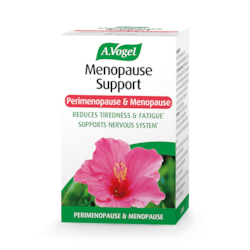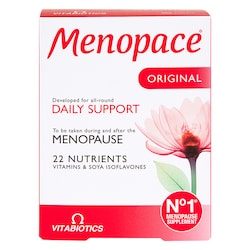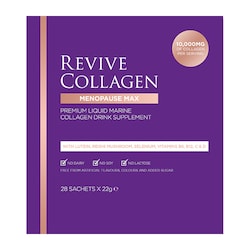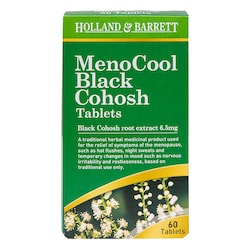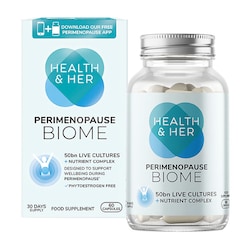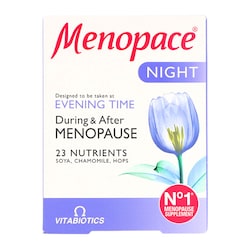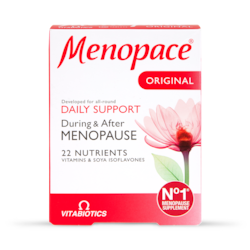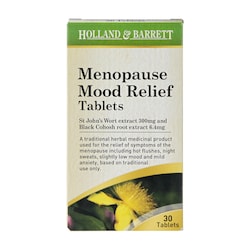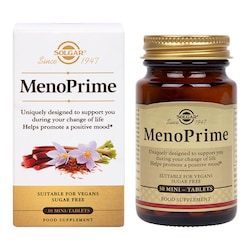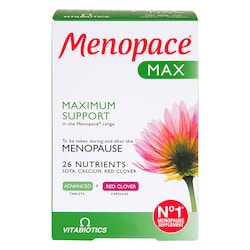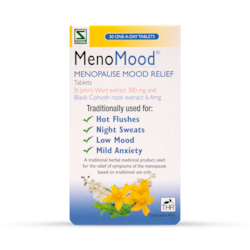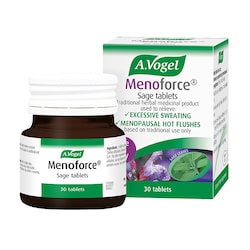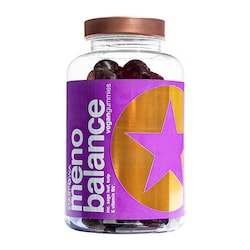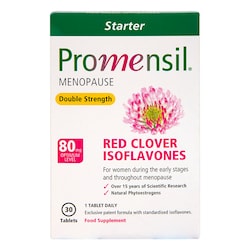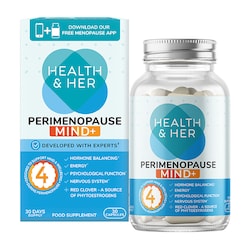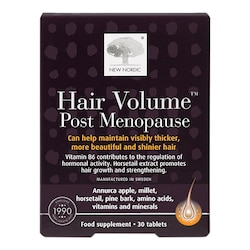20% off £30
Code:EASTER
11 natural remedies for menopause & symptoms

From sage to vitamin E, here are 11 natural remedies for menopause symptoms and the scientific evidence that backs them up.
Summary
1Common menopause symptoms
Menopausal symptoms may include: hot flushes – 75% of women report these, night sweats, sleeplessness , vaginal dryness, which may make sex painful...
2The best supplements for menopause
Some herbal remedies for the menopause are anecdotal or based on traditional use, and others are backed by solid science. A survey by...
3Natural ways to help reduce hot flushes
Sage - Swiss researchers discovered that women taking a daily tablet of fresh sage leaves experienced a reduction in hot flushes by 50% in four...
Whether it’s puberty, periods or pregnancy, women are used to being challenged by their bodies. So, it’s no surprise that going through the menopause can be a concern, especially if you’re unsure about which remedies are right for you.
Hot flushes, night sweats and mood swings are just a few of the symptoms women have to contend with as we get older. But don’t despair, we’re here to tell you the menopause doesn’t have to be miserable.
What is the menopause?
Menopause is technically your last-ever period. The average age to experience it in the UK is 51.1
But the run-up to menopause, called perimenopause, can go on for several years beforehand. It’s during this time you might start experiencing symptoms.
As some women have their last period in their forties, this means you may start experiencing menopausal symptoms from your late thirties.
Symptoms can also continue for an average of four years after your last period, although they may last much longer than that for some women.2
Read our full guide on menopause here.
Supporting you through menopause
Common menopause symptoms
As you get older and your egg supply declines, your ovaries gradually produce less oestrogen. It’s this change in hormone levels that cause the symptoms of menopause.
Menopausal symptoms may include:3
- hot flushes – 75% of women report these
- night sweats
- sleeplessness
- vaginal dryness, which may make sex painful
- itchy skin
- painful joints
- anxiety and low mood
You won’t necessarily get all these symptoms – in fact, some women breeze through the menopause without a hint of a hot flush – but for many, their symptoms can get in the way of life.4
These days, menopause can be particularly difficult as women in their forties and fifties are likely to be at their busiest. You may be at the peak of your working life, with children – maybe young children – still at home.
You may be single and dating, perhaps after a divorce. Or you might be looking after elderly parents. No wonder it’s difficult to deal with uncomfortable, inconvenient and even distressing symptoms on top of all this.
Fortunately, there are some proven, natural ways to help yourself with herbal and nutritional supplements, along with lifestyle changes. These may not lead to the dramatic changes you’d see with HRT but if you’d rather take a natural approach, reducing symptoms may be enough to make a big difference to your life.
Lead a healthy lifestyle
Menopause experts agree that eating a healthy balanced diet, with plenty of wholegrains and fruit and veg, can help your body cope with menopausal changes.
Exercise is important too. A large South American study found women exercising less than three times a week were 28% more likely to experience severe menopausal symptoms, particularly hot flushes and low mood.
The researchers think getting active can help ease stress and depression, which allows your brain to cope better with menopausal symptoms. You could try yoga; preliminary research found a regular class may ease hot flushes.5
Handpicked content: How to reduce stress.
Summary
- The menopause can be a stressful time, and coping with the symptoms of perimenopause (the run up to menopause) can be difficult
- There are several natural remedies that can help ease symptoms like hot flushes, night sweats and vaginal dryness
- Lifestyle factors like a healthy diet and regular exercise can also help you cope with menopausal changes
The best supplements for menopause
Want to manage your menopause symptoms naturally?
Since ancient times, women have found ways to harness nature to help with the menopause and the discomfort it can bring.
Some herbal remedies for the menopause are anecdotal or based on traditional use, and others are backed by solid science.
A survey by the British Menopause Society found 95% of women would try natural remedies before hormone replacement therapy (HRT) to help keep hot flushes, mood swings and other symptoms at bay.6
Either way, it’s your choice how you approach this time of change.
Read on to discover some natural menopause treatments that really work, plus the available evidence behind them.
Natural ways to help reduce hot flushes in menopause
- Sage
You’d normally find sage in a recipe for stuffing, but sage preparations have been traditionally used as natural remedies for menopause for hundreds of years. Sage has been thought to help relieve a range of symptoms including hot flushes and night sweats. Now, there’s some scientific evidence to back up these claims.
In 2011, Swiss researchers discovered that women taking a daily tablet of fresh sage leaves experienced a reduction in hot flushes by 50% in four weeks. After continuing to take sage, hot flushes among the participants were reduced by 64% within eight weeks.7
According to the same study on sage, the helpful herb could reduce psychological symptoms of the menopause, such as mood swings, by 47%, too.
In the Swiss study, the women took a tablet made from fresh sage leaves, which are available at health food shops. Alternatively, you could make a sage tea using ready-made sage tea bags, or with loose, dried sage leaves in a strainer with boiling water poured on top and left to cool.
- Vitamin E
Vitamin E is known for its ability to support healthy skin and eyes, but research now shows it could be a natural remedy for menopause, too. A 2007 study published in the journal Gynaecologic & Obstetric Investigation reported that menopausal women taking 400mcg of vitamin E every day for four weeks experienced fewer hot flushes and that the flushes they did experience were less severe.8
Not only this, vitamin E might also help relieve common skin issues such as itchy skin in menopause, both by being ingested and applied topically.
Vitamin E works to soothe skin issues by acting as an antioxidant, protecting the skin from environmental damage, strengthening the skin’s barrier against free radicals and holding moisturising properties.9
You can find vitamin E in avocados, nuts and seeds, plant oils like olive oil, and in various skincare products such as creams, serums and oils.
Natural ways to help prevent vaginal dryness
Many women say they experience a dip in their sex life during menopause. This is completely normal and not a cause for concern from a medical point of view.
However, intimacy is important at every stage of adulthood, and symptoms like vaginal dryness and vaginal atrophy (where the tissues of the vagina start to thin) aren’t great bedfellows for romance.
Over the counter creams can be a good option, but if you’d rather take a more natural approach, try the following:
- Sea buckthorn
This hardy shrub could be an effective natural remedy for menopause dryness, especially in women who can’t use oestrogen creams or suppositories.
Sea buckthorn oil is rich in fatty acids that may help maintain healthy cell barriers and promote elasticity.10
In a controlled trial by the University of Turku, Finland, women taking sea buckthorn oil every day for three months said they experienced less vaginal dryness, itching and burning, while additional tests showed the oil could help improve atrophy.11
- Coconut oil
To get immediate relief, you may be wondering about the best lubricant for menopause dryness. Many women swear by coconut oil. This thick, natural oil is safe for use on most skins and contains emollient properties.12
When it comes to menopause dryness, natural remedies appeal because you don’t want to risk causing irritation in delicate areas. However, remember that herbs can be potent and capable of causing skin irritation or even allergic reactions.
Of course, if you’re allergic to coconut you shouldn’t be putting it anywhere near your skin! Otherwise, perform a patch test on an area of sensitive skin and wait for 24 hours. If all seems well, try it out as a personal lubricant.
Coconut oil can also help relieve itchy skin in menopause. Try warming around half a teaspoon of coconut oil in your hands before rubbing it over your skin. It might feel greasy for a moment, but it soon sinks in.
Boosting low libido with herbs
It’s no secret your sex drive can take a hit during menopause. Luckily, there are natural ways to give it a boost.
- Ginkgo biloba
This strangely-named herb comes from the leaves of the ancient maidenhair tree. A 2014 Iranian study found that women taking ginkgo biloba as an herbal remedy for menopause every day for 30 days felt more sexual desire compared with those taking a placebo.13
Ginkgo biloba has also been shown to help relieve some of the psychological symptoms of the menopause - including memory problems and mild anxiety.14 So, ginkgo can restore your get-up-and-go in more ways than one!
Beat night sweats
- Soy
Soy is an oestrogenic plant, which means it is able to mimic the effects of oestrogen in the body.15
Soy has been widely studied for its impact on symptoms of the menopause, particularly hot flushes and night sweats. This is why it’s commonly recommended among herbal remedies for menopause.
A 2015 meta-analysis of quality medical studies concluded that phytoestrogens, including soy, could reduce the frequency of hot flushes by 11%.16
Be aware that takes time for soy to take effect – experts suggest you may need to take it for at least three months before you start to feel the benefits.17 You can consume soy either as a food such as tofu or soya milk, or in a supplement as soy isoflavones.
Other supplements to help with the menopause
A review of studies on 1,400 menopausal women found that taking black cohosh for menopause reduced hot flushes and sweating by 25%.18
The berry from agnus castus has shown to help the PMS-like symptoms of the perimenopause.19
Applied to the skin, its oil can help with night sweats and hot flushes.20
It contains oestrogen-mimicking soya isoflavones. Evidence shows red clover can significantly improve symptoms in post-menopausal women.21
It may also help lower levels of fats called triglycerides in the blood – important, because the risk of heart disease can rise after menopause.
This yellow flower produces a rich oil which has long been associated with female health. Some studies have shown promising results for evening primrose oil for menopause symptoms including uncomfortable hot flushes.22
This natural supplement may be known more for its effect on low mood, but research has found it could also reduce menopausal symptoms such as hot flushes and night sweats.23
St John's Wort could help with the anxiety that can often accompany perimenopause too.
Always check the label and follow dosage carefully. As with all complementary and alternative medicine, do not rely on herbal remedies in place of proper care by a GP or medical professional.
- These 11 natural supplements, including coconut oil, sea buckthorn and gingko biloba may help relieve symptoms of perimenopause like hot flushes, low mood and loss of libido
The final say
- The menopause can be difficult, with symptoms like low mood, lack of libido and night sweats
- Lifestyle factors like a healthy diet and regular exercise can also help you cope with menopausal changes, as well as natural supplements like sage, vitamin E and red clover
- https://www.nhs.uk/conditions/menopause/
- https://www.nhs.uk/conditions/menopause/
- https://www.nhs.uk/conditions/menopause/
- https://www.nhs.uk/conditions/menopause/
- https://www.ncbi.nlm.nih.gov/pmc/articles/PMC4110168/
- https://www.womens-health-concern.org/help-and-advice/factsheets/complementaryalternative-therapies-menopausal-women/
- https://www.ncbi.nlm.nih.gov/pubmed/21630133
- https://www.ncbi.nlm.nih.gov/pubmed/17664882
- https://www.ncbi.nlm.nih.gov/pmc/articles/PMC4976416/
- https://lipidworld.biomedcentral.com/articles/10.1186/s12944-019-1065-9
- https://www.sciencedirect.com/science/article/pii/S0378512214002394
- https://pubmed.ncbi.nlm.nih.gov/19134433/
- https://www.ncbi.nlm.nih.gov/pmc/articles/PMC4061626/
- https://pubmed.ncbi.nlm.nih.gov/27908257
- https://www.ncbi.nlm.nih.gov/pmc/articles/PMC3074428/
- https://www.ncbi.nlm.nih.gov/pmc/articles/PMC4389700/
- https://bpspubs.onlinelibrary.wiley.com/doi/full/10.1111/bcp.12533
- https://www.ncbi.nlm.nih.gov/books/NBK79338/
- http://anyflip.com/kfvb/wlzq/basic
- https://eurekamag.com/pdf/004/004384381.pdf
- https://www.ncbi.nlm.nih.gov/pmc/articles/PMC3590693/
- https://pubmed.ncbi.nlm.nih.gov/23625331/
- https://www.nice.org.uk/guidance/ng23/ifp/chapter/treating-menopausal-symptoms


